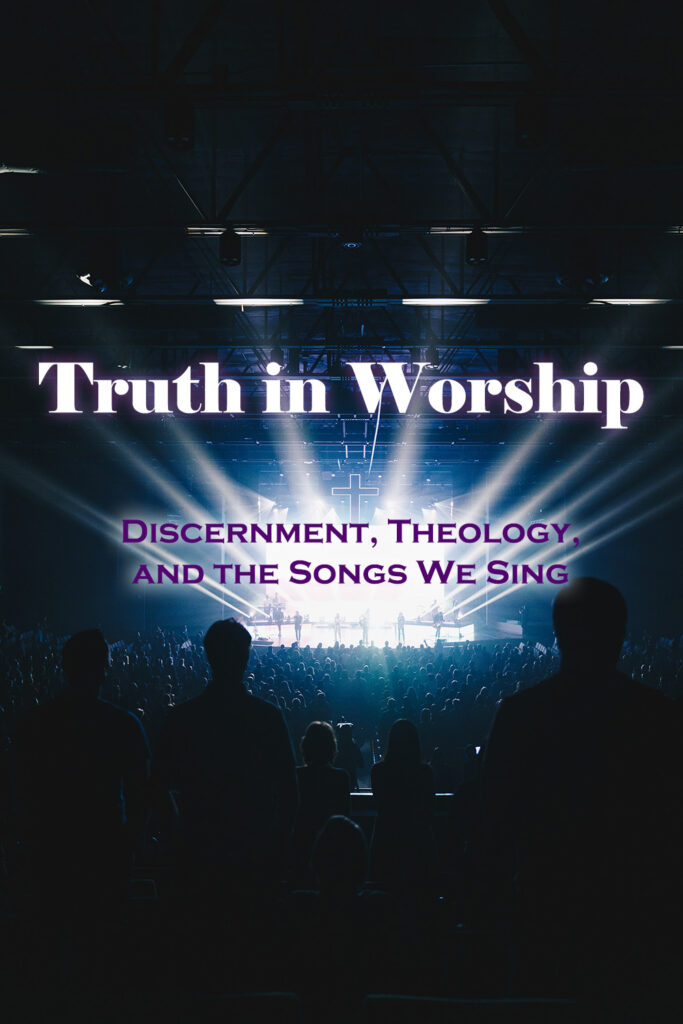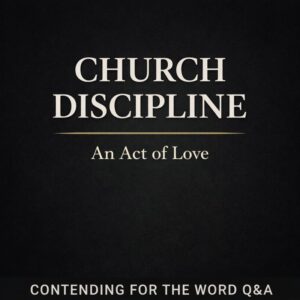⏱️ Estimated Reading Time: 9 min read
What is Biblical Worship? Honoring God According to His Word
By Dave Jenkins
In a day when churches are more likely to be evaluated by musical style than theological substance, it’s critical that we return to a foundational question: What is biblical worship?
Worship is not whatever feels spiritual. It’s not about fog machines, dim lights, or personal playlists. Worship is not defined by atmosphere—but by God’s Word. Biblical worship is God-centered, Christ-exalting, Spirit-empowered, and Scripture-regulated. It’s not our invention. It’s our response to God’s revelation, on His terms, for His glory.
Worship Begins with God’s Revelation, Not Our Imagination
The worship of God must begin with God Himself. He initiates. He commands. He reveals. From the moment God revealed Himself to Moses at the burning bush (Exodus 3), to the thunderous encounter on Mount Sinai (Exodus 19–20), worship has always been a response to the self-revealed holiness of God. The second commandment makes this clear:
“You shall not make for yourself a carved image… You shall not bow down to them or serve them…” (Exodus 20:4–5).
To approach God on our terms is not worship—it’s idolatry. John Calvin warned that the human heart is “a perpetual factory of idols,” and our man-centered ideas of worship are often the most dangerous ones. True worship begins not with creativity but with submission to the God who has spoken.
Worship is Rooted in the Word of God
Biblical worship is always anchored in Scripture. It is shaped by the commands of God, not the preferences of man. Colossians 3:16 encourages believers in this way, “Let the word of Christ dwell in you richly… singing psalms and hymns and spiritual songs, with thankfulness in your hearts to God.”
The Reformation recovered the Regulative Principle of Worship—the conviction that God is to be worshipped only in ways He has commanded in His Word. This principle isn’t about legalism, it’s about reverence. This means Scripture must guide:
• The content of our songs.
• The form of our prayers.
• The structure of our services.
• The administration of the sacraments.
• The tone and goal of the preaching.
To worship without the Word is to drift toward man-centered manipulation. The Scriptures are sufficient—not just for salvation and sanctification—but for worship itself (2 Timothy 3:16–17).
Worship is Christ-Centered and Gospel-Fueled
We do not approach a holy God in our own merit. We come through the finished work of Christ. Hebrews 10:19-22 encourages us, “Since we have confidence to enter the holy places by the blood of Jesus… let us draw near with a true heart in full assurance of faith.”
Every act of true worship is gospel-shaped. It proclaims our need, magnifies Christ’s sufficiency, and leads to grateful adoration. Without the gospel, worship becomes moralism or self-improvement. This is why the Lord’s Day is central. On the first day of the week, we gather to celebrate the resurrection, rehearse redemption, and fix our eyes on the risen King. Sunday isn’t about “recharging.” It’s about reorienting our lives around Christ.
Jonathan Edwards said it well, “The essence of all true religion lies in holy affections. But they must be rooted in truth.” In biblical worship, Christ is not background; He is center stage.
Worship is Corporate Before It is Personal
Yes, worship should be personal—but it’s never private. In Scripture, worship is overwhelmingly a gathered act—the people of God assembled under the His Word, responding with unified reverence and joy.
Acts 2:42 states, “And they devoted themselves to the apostles’ teaching and the fellowship, to the breaking of bread and the prayers.” This is where much of modern evangelicalism has drifted. Worship has been individualized into private spiritual expression. But the New Testament picture is one of assembly—preaching, praying, singing, and partaking in the ordinances together.
When we neglect the corporate gathering (Hebrews 10:24–25), we sever ourselves from the very means God uses to strengthen His people. Our spiritual formation is not a solo endeavor—it’s a community calling.
Worship Must Be in Spirit and in Truth
Jesus’ words in John 4:23 are foundational, “The hour is coming, and is now here, when the true worshipers will worship the Father in spirit and truth…” To worship “in spirit” is to worship from the heart, by the power of the Holy Spirit. To worship “in truth” is to worship in accordance with God’s Word. Both are essential. Spirit without truth becomes emotionalism. Truth without Spirit becomes dead orthodoxy. The Bible calls for engaged minds and enflamed hearts.
As Hebrews 12:28-29 says, “Let us offer to God acceptable worship, with reverence and awe, for our God is a consuming fire.” The holiness of God demands reverence. The grace of God compels joy. Biblical worship is the fusion of both.
Worship Transforms the Worshiper
Worship isn’t performance. It’s formation. In Romans 12:1 Paul exhorts, “I appeal to you… to present your bodies as a living sacrifice… which is your spiritual worship.” As we behold the glory of God in worship, we are changed (2 Corinthians 3:18). The Spirit uses the rhythms of Word-centered worship to shape our desires, correct our thinking, and fuel our obedience. Worship reminds us of who God is, who we are, and what we need. It’s not a break from discipleship—it’s the engine of discipleship.
Biblical Worship Confronts Cultural Counterfeits
Worship that conforms to Scripture will clash with the culture.
• Worship says God is King—not self.
• Worship says truth matters—not feelings.
• Worship says God is holy—not casual.
That’s why faithful worship is countercultural. It teaches reverence in an irreverent age. It prioritizes the Word in a world obsessed with image. It teaches us to value God’s presence more than personal preference. Worship is warfare. Every Sunday we’re being re-formed, re-aligned, and re-commissioned for life in a fallen world.
A Call to Church Leaders: Shepherd Worship Wisely
To pastors and ministry leaders: you are worship shepherds. Your task is not to entertain sheep, but to feed them the Word and lead them in honoring the Chief Shepherd. Prioritize what God prioritizes:
• Preach the Word with clarity and conviction.
• Guard the ordinances.
• Train your musicians in theology, not just talent.
• Lead your people to love truth and sing with joy.
R.C. Sproul once said, “The greatest need in worship today is the recovery of the biblical concept of the holiness of God.” That recovery begins in the pulpit and at the Lord’s Table—not the soundboard.
Worship and the Posture of Reverence (Isaiah 6 and Psalm 95)
Biblical worship is not casual—it is reverent, weighty, and humbling. In Isaiah 6, the prophet sees the Lord seated on His throne, high and lifted up. The seraphim cry, “Holy, holy, holy is the Lord of hosts; the whole earth is full of His glory!” Isaiah’s response is not excitement but trembling: “Woe is me! For I am lost.”
This kind of reverence is echoed in Psalm 95:6–7, “Come, let us worship and bow down; let us kneel before the LORD, our Maker! For He is our God.” In true worship, we see ourselves rightly because we see God rightly. Worship isn’t flippant or casual. It is deeply joyful—but also deeply reverent.
Worship and Everyday Life
Biblical worship doesn’t end when the church service does. It fuels a life of obedience, gratitude, and gospel witness. In Colossians 3:17, Paul reminds us, “And whatever you do, in word or deed, do everything in the name of the Lord Jesus…”
Sunday worship is not a compartment. It’s the catalyst for Monday faithfulness. When we sing about God’s holiness, we are being formed to walk in holiness. When we hear the gospel preached, we are being prepared to speak it during the week. The worship of God overflows into work, parenting, rest, and outreach. Romans 12:1 reminds us that offering our whole selves as “a living sacrifice” is spiritual worship. Every act of obedience, when done in faith and for the glory of God, is worship.
A Snapshot from History: Worship in Geneva
In the 1500s, John Calvin transformed worship in Geneva—not with choirs or lighting, but with Scripture. He simplified the services, removed superstition, and centered everything on the Word of God. The congregation sang Psalms. The pulpit was central. The Lord’s Supper was administered with reverence. Preaching was expository and regular.
Calvin believed that worship should reflect the character of God—holy, orderly, and edifying. His legacy reminds us that when the Church is reformed by the Word, her worship becomes more beautiful, not less.
A Word for Households and Small Churches
You don’t need a big budget or a large building to worship biblically. You need God’s Word, God’s people, and a desire to honor Him. In small churches, biblical worship is just as vital—and just as powerful—as it is in large ones. In fact, there is often more simplicity and focus in such settings. Singing together, praying faithfully, and hearing the Word preached reverently—this honors the Lord.
The same is true in the home. Family worship—opening the Bible, praying, and singing—can become a holy rhythm that shapes children for a lifetime.
Common Questions about Biblical Worship
Question: Isn’t God more concerned with my heart than the method?
Answer: God certainly desires your heart—but He also commands how He is to be worshipped (Deuteronomy 12:32). Heartfelt worship must still be obedient worship.
Question: Can’t we use creativity to reach more people?
Answer: Creativity isn’t wrong—but it must be constrained by Scripture. Worship should engage, but never entertain. God’s glory—not our appeal—is the goal.
Question: Isn’t all of life worship? Why focus so much on Sunday?
Answer: All of life is worship (Romans 12:1), but the Lord’s Day gathering is unique. It is God’s appointed means to form and feed His people corporately.
Conclusion: Worship is for the Glory of God Alone
Worship is not for our entertainment. It’s not for applause. It’s not even primarily for our spiritual nourishment—though we’re surely strengthened by it. Worship is for the glory of God alone.
Psalm 29:2 exclaims, “Ascribe to the Lord the glory due his name; worship the Lord in the splendor of holiness.” Let us come before the Lord each Lord’s Day with reverence and joy. Let our churches be marked by truth-filled songs, Christ-centered preaching, Spirit-led prayers, and faithful observance of the ordinances. Let us not offer what is easy—but what is excellent, obedient, and pleasing to the Lord.

Truth in Worship: Discernment, Theology, and the Songs We Sing
Dave Jenkins is happily married to his wife, Sarah. He is a writer, editor, and speaker living in beautiful Southern Oregon. Dave is a lover of Christ, His people, the Church, and sound theology. He serves as the Executive Director of Servants of Grace Ministries, the Executive Editor of Theology for Life Magazine, the Host and Producer of Equipping You in Grace Podcast, and is a contributor to and producer of Contending for the Word. He is the author of The Word Explored: The Problem of Biblical Illiteracy and What To Do About It (House to House, 2021), The Word Matters: Defending Biblical Authority Against the Spirit of the Age (G3 Press, 2022), and Contentment: The Journey of a Lifetime (Theology for Life, 2024). You can find him on Facebook, Twitter, Instagram, Youtube, or read his newsletter. Dave loves to spend time with his wife, going to movies, eating at a nice restaurant, or going out for a round of golf with a good friend. He is also a voracious reader, in particular of Reformed theology, and the Puritans. You will often find him when he’s not busy with ministry reading a pile of the latest books from a wide variety of Christian publishers. Dave received his M.A.R. and M.Div through Liberty Baptist Theological Seminary.




